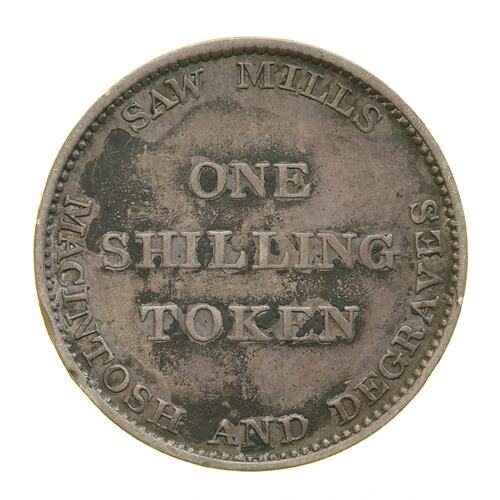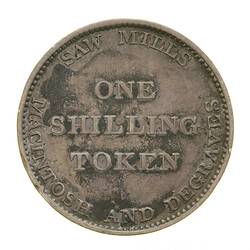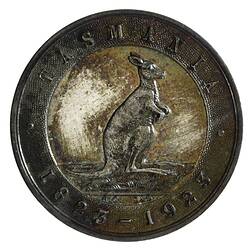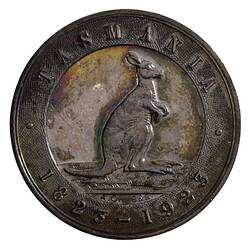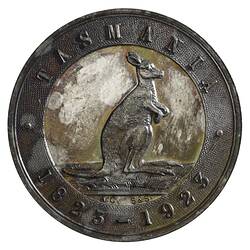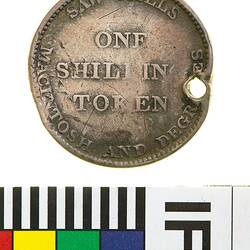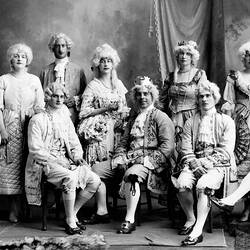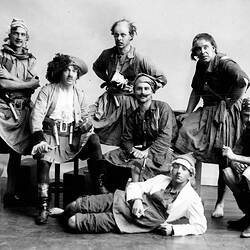Roger McNeice covers the story of the uncirculated, but nonetheless famous silver '1823 Tasmanian Shilling' token in detail in his Coins and Tokens of Tasmania, pp.92-102. Below is a summary.
Principals: Peter Degraves (born Dover, England, 1778 and died the Cascades, Hobart Town, Tasmania, 31 December 1852), and Hugh Macintosh (born circa 1776, died the Cascades, Hobart Town, Tasmania, 24 December 1834). The two men were brothers-in-law.
Before migrating to Van Diemen's Land, Macintosh was a Major in the East India Company Service, and from 1813 to 1819 he served at the Court of Persia, 'reorganising their system of tactics.' Upon his return to England he retired at half pay for life. Degraves was 'an architect, engineer, surveyor, and business man,' served at the bar at Grey's Inn for two years and practiced as a magistrate in two counties. He is thought to have lost heavily in business dealings before his decision to emigrate in 1820-1821, and may have wanted to start a new life.
Degraves obtained letters of recommendation from the Colonial Office in 1821, for himself and his partner. They intended to establish a sawmill and purchased a plant for the business, and a ship to transport it in. It is thought that they also had their shilling tokens struck, most likely at the Soho mint in Birmingham, before they left England. The partners chartered the Hope, and were set to depart on 20 August 1821. According to a source quoted by McNeice, they had arranged to take 15 families of Wesleyan Methodists as passengers, but on the departure date 13 of the parties were not ready to leave and had to cancel their passage. At the end of October the ship was again ready to sail, but rough weather caused damage necessitating a return to port, and 'to make matters worse the ship incurred further damage by careless handling on the part of the Harbour Master, to such an extent that it was required to be dry docked.'.
While the owners were waiting to have the ship repaired, the passengers became very agitated about the delay. They drew up a list of complaints, which attracted the attention of customs officials, and then the Colonial Office. Although the complaints were later found to be unfounded, the Lords of the Treasury accepted a report from a customs officer endorsing them. Customs officers took posession of the ship and its cargo on 18 May 1822, and Macintosh and Degraves were arrested for their debts on the 25th.
The inquiry of the Honourable Board of Customs found that: 'they could not withhold a suspicion that in all the statements that had been made, the passengers were actuated by a desire to procure a free passage for themselves, and to get rid of the owner's claim on them for the balance of their passage-money...[and] That, on the hand, a very high character had been given of the owners by people of greatest respectability; that it did not appear that they had shown any disposition to withhold from any of the passengers necessary food or accommodation, and consequently, they [the Board of Customs] could not recommend any prosecution.'
Macintosh and Degraves then petitioned for their passengers to receive a free passage anyway, as their vessel would be unseaworthy for some time. Their former passengers, including R. Andrew Mather and family, departed Ramsgate Harbour on the Heroine in late 1822.
The Hope finally left England on 19 September 1823 and arrived in Hobart on 18 April 1824. On 3 June 1824 they received a grant of land at the 'Cascades', near Hobart, where they had received a grant of 2,000 acres, the services of three convict carpenters for six months, and a gang of 20 convict labourers. The business commenced operations on 13 August 1824. The business only endured for a little over two years under the original partners, because on 5 May 1826 Degraves was imprisoned over a debt incurred in England that he refused to acknowledge. In August the sawmill was to be put up for sale, but Degraves proclaimed himself insolvent, delaying the sale. On 24 October 1826 the partnership between Macintosh and Degraves was dissolved.
From McNeice's account Macintosh had a quiet life after his partnership with Degraves, dying at the end of 1834. Degraves was imprisoned until 1831, and designed a new prison during that time. He went on to be involved in establishing the Cascade brewery (famous and still producing beer), the public water supply, a ship building company and establishing the 'Theatre Royal', between 1831 and his death in 1852. The Theatre Royal is still a venue for live theatre, and an important part of Hobart's built heritage today.
Their famous tokens, which never made it to Australia to be circulated, are thought to have been among the cargo of the Hope which were confiscated by Customs Officers in 1822. The British Museum received the examples now in their collection in 1848.
References:
McNeice, R., Coins and Tokens of Tasmania, 1803-1910, pp.92-102.
See article from Australian Year Book, 1998 http://www.abs.gov.au/Ausstats/[email protected]/0/191ecd1c676ed50eca256c320024165b?OpenDocument
Images of the Theatre Royal are held by the State Library of Tasmania and the National Gallery of Australia, and the buiding is listed on the Register of the National Estate: http://images.statelibrary.tas.gov.au/Fullimage.asp?ID=AUTAS001124068602
http://australianprints.gov.au/Search/Detail.cfm?searchID=2&WorkID=92512&ArtistID=2812&ZoomID=3&SrchV=1
http://www.deh.gov.au/cgi-bin/heritage/photodb/imagesearch.pl?proc=detail;barcode_no=rt28088
Museum Victoria holds two images of the cast of 'Make Believe', a play by A.A. Milne, produced at the Theatre Royal in 1922 (MM 008475; MM 008474). The State Library of Tasmania also holds a very large collection of posters advertising productions presented at the Theatre Royal.
More Information
-
Keywords
-
Localities
-
Authors
-
Article types
